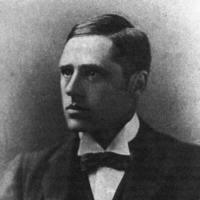The Man From Goondiwindi, Q.
I
This is the sunburnt bushman who
Came down from Goondiwindi, Q.
II
This is the Push from Waterloo
That spotted the sunburnt bushman who
Came down from Goondiwindi, Q.
III
These are the wealthy uncles—two,
Part of the Push from Waterloo
That spotted the sunburnt bushman who
Came down from Goondiwindi, Q.
IV
This is the game, by no means new,
Played by the wealthy uncles—two,
Part of the Push from Waterloo
That spotted the sunburnt bushman who
Came down from Goondiwindi, Q.
V
This is the trooper dressed in blue,
Who busted the game by no means new,
Played by the wealthy uncles—two,
Part of the Push from Waterloo
That spotted the sunburnt bushman who
Came down from Goondiwindi, Q.
VI
This is the magistrate who knew
Not only the trooper dressed in blue,
But also the game by no means new,
And likewise the wealthy uncles—two,
And ditto the Push from Waterloo
That spotted the sunburnt bushman who
Came down from Goondiwindi, Q.
VII
This is the tale that has oft gone through
On western plains where the skies are blue,
Till the native bear and the kangaroo
Have heard of the magistrate who knew
Not only the trooper dressed in blue,
But also the game by no means new,
And likewise the wealthy uncles—two,
And ditto the Push from Waterloo
That spotted the sunburnt bushman who
Came down from Goondiwindi, Q.
The Evening News, 17 Dec 1904
(This verse was published, copiously illustrated by Lionel Lindsay. Each stanza had its own illustration.)
The pronounciation of many Australian place-names can be quite unexpected. Goondiwindi is a case in point. The town is situated on the border of Queensland and New south Wales, on the banks of the Macintyre River, and its name is pronounced “gun-da-windy”, with the main stress on the third syllable, a secondary stress on the first.

